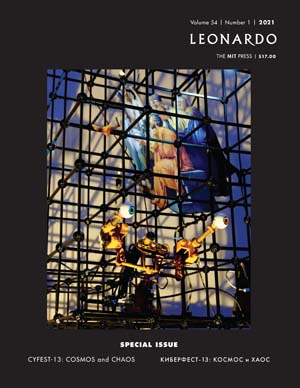Cyland Foundation Inc.
ARE PROUD TO PRESENT:
“Cosmos and Chaos”
A special issue of Leonardo journal (MIT Press).

Leonardo is a peer-reviewed academic journal published by The MIT Press. Founded in 1967 in Paris by kinetic artist and astronautical pioneer Frank Malina, Leonardo has become the leading international journal on the influence of science and contemporary technology on art and music, and also on how art and discoveries in the humanities change science and technology. Leonardo articles are actively indexed and hold third place on Google Scholar among texts on visual art (data for 2020).
The special issue of the journal was prepared by curators of CYLAND MediaArtLab and Leonardo/The International Society for the Arts, Sciences and Technology (Leonardo/ISAST). 12 authors contributed to the journal, including Russian and foreign artists, curators, art critics, collectors, biologists, astrophysicists, specialists on the history of the Russian avant garde, independent researchers and lecturers from the world’s leading universities. The theme of the issue is “Cosmos and Chaos”. The publication is part of CYFEST-13, which also has the theme of cosmos and chaos this year.
Authors: Daniela de Paulis (Netherlands), Alexandra Dementieva (Belgium), Zandrine Chiri (France), Bettina Forget (Canada), Elena Gubanova (Russia), Annick Bureaud (France), Natalia Kolodzei (USA), Priyamvada Natarajan (USA), Saskia Vermeylen (UK), Aleksandra Shatskikh (Russia), Olesya Turkina (Russia), Linda T. Elkins-Tanton (USA), Diana Ayton-Shenker (USA).
Compiling editors: Erica Hruby (Leonardo/ISAST), Lydia Griaznova (CYLAND).
The decision was made to publish the journal in two languages in an attempt to break down the constraints imposed by the Covid-19 pandemic via international cooperation in the transdisciplinary field of arts and sciences. Russian readers can learn about new authors and studies, and the international audience can discover different periods of Russian art, examined in the context of the history of exploring and studying the cosmos.
In examining the theme of the issue, the authors address an unprecedentedly broad range of topics: interspecies communication; the spread of interplanetary civilizations and immersive installations; representation of women in science and participatory projects; the African archive and the inclusiveness of international space law; interpretation of time, space and light in multimedia installations; space sculptures and a satellite as a performer on the orbital stage; the aesthetics of technological art of the 1980s-1990s; Russian cosmism and the art of Soviet non-conformism; historical and contemporary map-making of dark material; the cosmic visionariness of Kazimir Malevich and more. A separate article in the journal contains excerpts of recollections by the Soviet photographer Leonid Lazarev and rare photos taken at the Soviet government’s historic meeting with Yuri Gagarin after his first space flight.
In total, around 120 Russian thinkers, artists and writers are mentioned in the issue.
The online presentation of the issue “PERCEIVE COSMOS | EXPLORE CHAOS” will take place on 17 February at 8 p.m. Moscow time. Moderator: Erica Hruby (USA). Registration is required to take part: www.leonardo.info
A print or electronic copy of the journal can be purchased on the MIT Press website.
The article by Priyamvada Natarajan “Cosmos, chaos and order: map-making as knowledge” may be downloaded free of charge.
Organizers:
CYLAND MediaArtLab — one of the most active non-commercial organizations developing cyber art in Russia. Every year, CYLAND holds CYFEST, the biggest festival of media art in Eastern Europe, holds exhibitions and educational events all over the world, and also collects archives and video art and sound art. CYLAND brings together artists, critics, curators, programmers, engineers and media activists. It works on expanding the territory and possibilities of art, and also supporting artists working in the field of robotics, video, media, sound and Internet art.
Leonardo/The International Society for the Arts, Sciences and Technology (Leonardo/ISAST) is a nonprofit organization that serves the global network of distinguished scholars, artists, scientists, researchers and thinkers through our programs, which focus on interdisciplinary work, creative output and innovation. From its beginnings, Leonardo has served as THE virtual community for networking, resource-sharing, disseminating best practices, supporting research and offering events in art/science/technology.